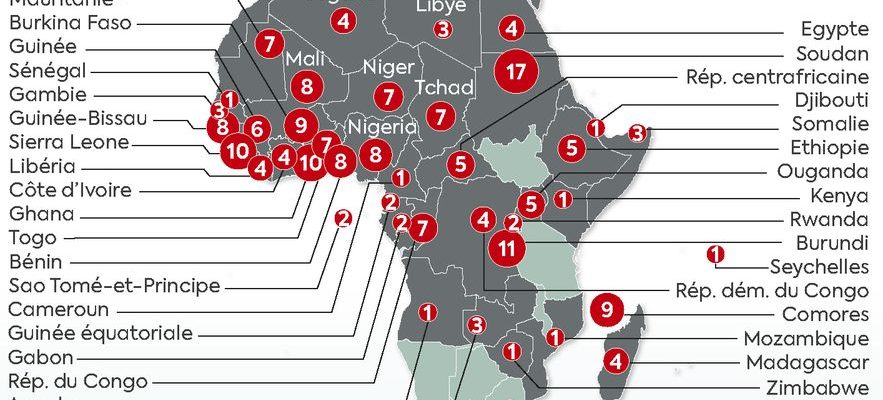This was one of the first responses from the international community to the situation in Niger. As of July 29, only three days after the coup that overthrew President Mohamed Bazoum, France announced that it was suspending “with immediate effect all its development aid and budget support actions in Niger”, as long as the constitutional order would not be restored. Paris was quickly followed by many Western countries such as Germany and the United States. But behind these diplomatic decisions, there is an organization with a troubled future: the Sahel Alliance.
This agency was created in 2017 at the initiative of France and Germany to organize international development aid in the Sahel. There are several Western states there, with, in addition to the Franco-German binomial, countries such as the United States, Italy and the United Kingdom. Its members also include international organizations such as the World Bank, the African Development Bank and the United Nations Development Programme. “The objective was to create a coalition of donors operating in the Sahel countries, in order to better coordinate and make their actions more effective. Behind it, the idea was to have faster impacts on the conditions lives of populations”, explains Jean-Marc Gravellini, associate researcher at IRIS and specialist in the Sahel, but also secretary general of the Sahel Alliance between 2017 and 2020. In 2021, the organization declared supporting nearly 1,200 projects in the Sahel, for a total amount of nearly 26.5 billion euros.
“Without a regional actor in front, it’s more complicated”
The existence of the Sahel Alliance is based on a central partner: the G5 Sahel. Created in 2014, this alliance brings together the five countries of the region (Niger, Mauritania, Mali, Chad and Burkina Faso), mainly around the fight against jihadism, but also for development issues. The Sahel Alliance aims to offer, mirroring this G5 Sahel, an international platform capable of aligning international aid with the needs and projects of governments.
Because in the region, international aid represents much more than a simple diplomatic accessory. In 2022 alone, France paid Niger more than 120 million euros in aid. A higher amount was planned for 2023, for the moment suspended. “Foreign aid represents 40% of our national budget, but it will not be paid if the coup succeeds,” deposed President Mohamed Bazoum was alarmed in a column published on August 3 in the american newspaper The Washington Post. “A totally plausible order of magnitude”, confirms Jean-Marc Gravellini, while Niger is one of the poorest countries in the world, with more than 40% of the population living in extreme poverty according to the World Bank (i.e. with less than $1.90 a day).
Behind this international aid, we find medium-term development projects, in agriculture, energy or education. But there is also a significant share for emergency aid, particularly undermined by this putsch and the international sanctions that followed. According to the International Committee of the Red Cross, 4.4 million people needed humanitarian assistance in 2022 in Niger. What lead about fifteen NGOs, such as Oxfam, Care or Action against Hunger, to be alarmed “that increased instability and sanctions could exacerbate the humanitarian needs of the most vulnerable, especially women and children”. A fear shared by the Sahel Alliance, which in a press release published this Tuesday, August 15, “condemns in the strongest terms” the coup d’etat in Niger, which “aggravates the complex challenges of development in the country and in the Sahel”.
Because it is this international aid system that is starting to lose its footing in view of the troubles in the region. Since 2020, between the coups in Mali, Burkina Faso and now in Niger, governments favorable to collaboration with Western countries have become increasingly rare. “This Sahel Alliance had a logic from the moment when there was in front of it an interlocutor on the Sahelian side, in charge of a coordinated vision, which was the G5 Sahel, notes Jean-Marc Gravellini. From the moment when Mali withdrew from the G5 Sahel, that Burkina Faso is much less involved in it, that Niger should have to take a step back if the current situation were to get bogged down… Without a regional actor opposite, it is more complicated.”
Towards a reconfiguration of the region
The military putsch in Niger was thus the final straw for the Western powers, which had not reacted so quickly until now. “In Mali and Burkina Faso, the coups did not have an immediate impact on international aid. This ended up being suspended in Mali long after the appearance of tensions between the putschists and the France. And in Burkina Faso, it was the junta’s open support for the coup plotters in Niger that led to the cessation of development aid, long after the coups d’etat,” explains Jean-Marc Gravellini “What what happened in Niger made ECOWAS and the international community realize that without a reaction, these coups d’etat could multiply, and that the military would get bogged down in power”, continues the researcher, also former executive director. of the French Development Agency.
3762-ITW_NIGER
© / art press
Behind the current troubles hangs the doubt of a reconfiguration of the balance of power in the region. “All this can lead to a distancing of these countries from their ECOWAS neighbors as well as from the Western liberal democracies. This is what we see with Mali, underlines Jean-Marc Gravellini. This place can be taken by other powers. The Russians are in ambush to be able to place their militias and take advantage of natural resources, but they do not have the scale to carry out development actions. For a country like China, on the other hand, it is is entirely plausible.”
